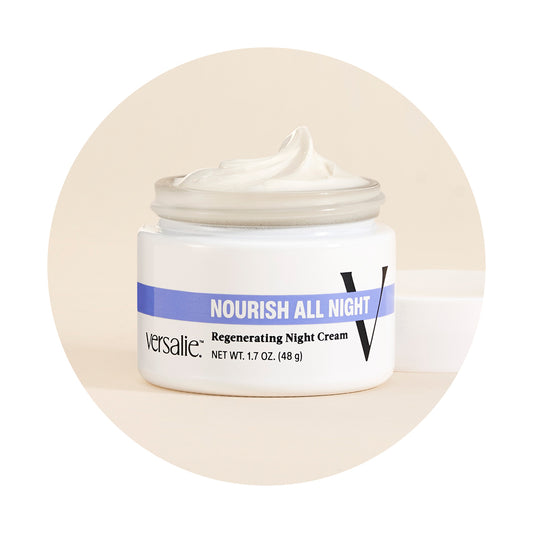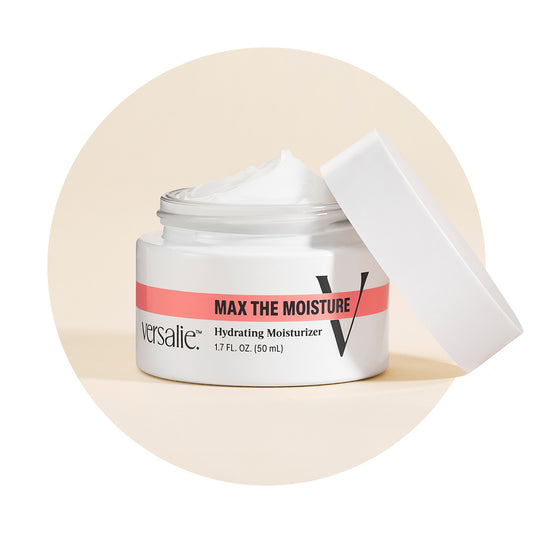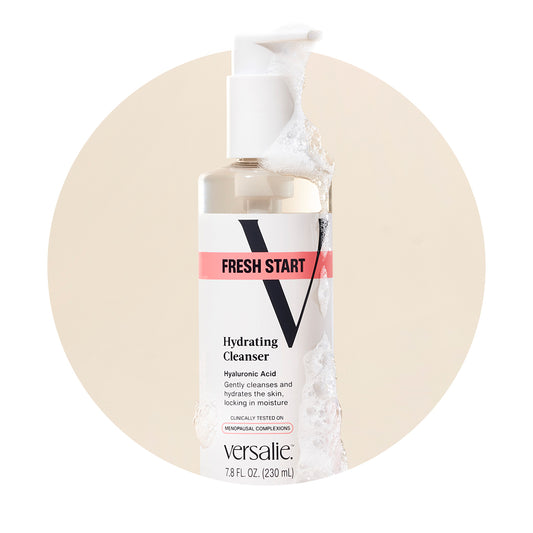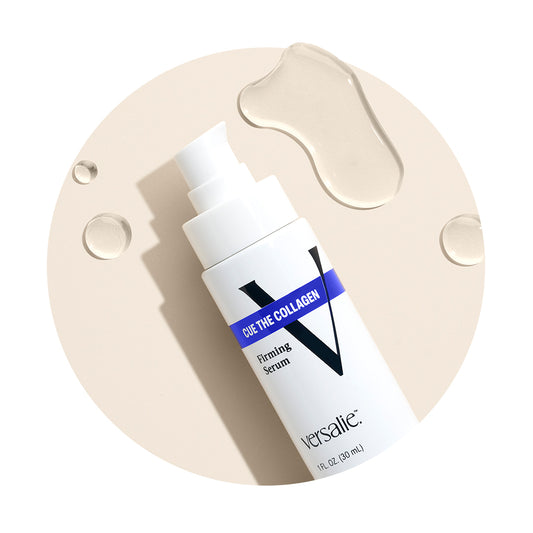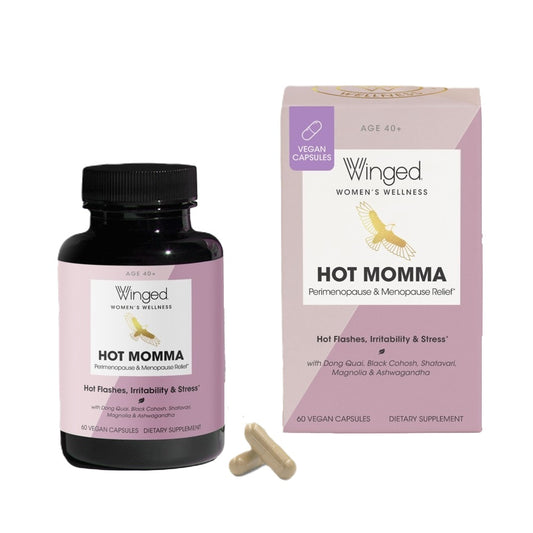The Versalie Ambassadors are a group of everyday people who are currently experiencing the ups and downs of the menopausal transition. They’ve been working with us to help build Versalie. Their experience and insights help us test our ideas, learn, and improve what we were creating. Their stories have the power to create real change.
We hope you see yourself in their stories — their symptoms, their highs and lows — and find that you’re not alone in this beautiful (but sometimes chaotic) phase of life.
Versalie Ambassador – Christina, 53
Postmenopausal, menopause at age 49
7+ symptoms, including thinning hair, anxiety, depression, mood swings, irregular periods, hot flashes, irritability
When and how did you first realize you were in perimenopause?
Looking back, there were a few odd things that happened. One of the first symptoms, I think, was dry eye. I also started having issues with my feet. I was walking a lot and thought the issues were due to increased exercise. I stepped out of bed one day and my foot started having severe pain. I scheduled a doctor’s appointment, and they sent me to a podiatrist. Of course, by the time I was able to get an appointment with the podiatrist, the foot pain had gone away.
About 6 months later, that’s when my hair started falling out. I started collecting it in envelopes to show the doctor each day how much hair I was losing. Both the dermatologist and my doctor told me that my hair wasn’t going to completely fall out and to relax. It was probably hormone related and they recommended hair loss products. The hair loss affected my self-confidence. I always had long, full hair.
I also noticed my anxiety increased to copious amounts. Everything made me sad, I was very angry, and just felt like I was falling apart, mentally.
Another aha moment was when I ended up in the ER for pains in my side. Once I went to the ER, the nurse (who was younger) noticed that I was shaking and extremely concerned that I was going to die. She advised me to speak with my doctor about menopause and that I may need medication due to my hormones.
I laugh now, but I was scared there was something seriously wrong with me. I’ve only had one surgery in my life, no major health issues, so I thought I was dying with cancer. Again, overthinking and Googling. It was IBS (irritable bowel syndrome) and my worrying and anxiety only made it worse.
My period changing was obviously another sign. I went 9 months without a period and I thought, “Okay, this is it!”. And then it started again. Then I had to wait again. But that period after the 9 months was the last one. It was a very rough and heavy period, but it was the last one! Prior to that, sometimes I would have a period every other month. During that time, every time I got my period, I’d yell to my husband, “I’m still young, I started my period. Yea!”.
You mentioned a few of your symptoms. Can you talk more about them and how they’ve affected you?
My symptoms definitely had an effect on my life. I was having trouble handling it all. I would watch commercials and bust out crying. And that’s not like me at all.
I volunteer at a cat shelter and there was one time, a guy in his 20s, came up to me when I was carrying a bag of cat litter, that was not very heavy. He was like “Ma’am, do you need some help? You’re wringing wet. What’s wrong with you? I thought you were having a stroke or something”. I had to tell him I was having a hot flash.
My anxiety ramped up too. I think it was a combination of menopause, the pandemic, and the political climate. I wanted to move to another state, withdraw from activities that gave me joy in the past. I had a feeling of hopelessness, being stuck, and feeling an immense amount of sadness. I felt like I was watching the world fall apart and there was nothing I could do but watch it happen.
I was in full-fledged menopause and didn’t have any medications. I was feeling very emotional — seeing protests on TV and people posting hateful things online. I don’t know what else to say besides it being an emotional time. I still have anxiety, but not nearly as bad as I did.

And I did get through the roughest part. I just kept thinking “What is happening to me? Why don’t I have any ambition?”. I felt like I was losing myself and wanted to commit myself to a hospital. But I did not, I worked through it the best that I could.
And the stress, the stress. Basically from 2020 until last year, my stress levels had been up. Sometimes you get so stressed, or you have anxiety to where you just freeze, or your body feels like you have aches and pains.
There was just so much anxiety and worry. I do not have children, I have cats. If I wasn’t sick, I thought my cats were sick. We were taking our cats to the vet for a minor sneeze, but in my head I thought something was really wrong with them. At the time a small problem or issue seemed like it was something catastrophic, every minor problem or concern felt like it was 10 times worse than it really was.
And there was so many things that I didn’t know if it was menopause or not.
- I got COVID last year and I thought I had long-term COVID for about 6 weeks. I had this ringing in my ears. That was menopause.
- Recently I went to a concert and never had a problem with dancing before. But I danced too much and ended up with plantar fasciitis. That was probably related to menopause.
- And I noticed that I couldn’t get up from a chair as quickly as I used to. I thought working from home and covering so many hours, I thought I had damaged myself. But it was also related to menopause.
“Another thing I didn’t see coming was that I lost self-confidence. I think it was because of being isolated, being depressed, being stuck, and just feeling stuck.”
What have you tried to do so far to manage your symptoms? Is there anything you’d like to try?
I went to the doctor, and she gave me a small dosage of an antidepressant. It took me about 2-3 months before I would take it because I was scared of the side effects. Up until I was 48, the only medication I took was my daily birth control pill. But then I started taking it on a regular basis. We had to work on adjusting my dosage, but it helped and it slowly worked. My doctor also advised that it should also help with hot flashes. I’ve been on it since, and will probably never stop taking it. She also gave me a low dose of an anxiety medication that I could take as needed.
I knew HRT existed, but I heard growing up about heart attacks, blood clots, all these things. And I didn’t know if I wanted to do that. I have a history of smoking, so I didn’t know if I could take HRT. I don’t know the answers to these questions.
I also looked into some clinics and compound pharmacies that say they can give you hormone treatments.
I’m in therapy, online therapy, and that has helped out tremendously.
I’m also trying to become more active. Walking seems to help a lot. I like walking because I’m out in nature and get to see animals, critters, and flowers. I live in an area where I can walk in my neighborhood and can also walk to a park.
I also took a multivitamin and I’ve been taking biotin for hair loss since I was in my 30s.
This is a personal story and is not intended to provide medical advice. Talk to your healthcare provider about potential options that can work for you.
Have you talked to a medical professional about your perimenopause symptoms? How’d that go?
As I mentioned earlier, I’ve been to a number of doctors. I went to the eye doctor for dry eye. The dermatologist and my doctor didn’t see that my hair was falling out, even though I was noticing a big change. I also went to a podiatrist for my foot problem. I also saw a gastroenterologist because of all the problems I was having with my stomach. She thought it was IBS, which can also possibly be related to menopause, and my nerves. My nerves and emotions were all over the place. I also went to a dermatologist because my eczema was spreading.
I went to the nurse practitioner, who was able to prescribe me the antidepressant and medication to help with anxiety. And I want to follow up with her for more information.

I went to an OB-GYN for my yearly check-up, no problems whatsoever. They did the breast exam, etc. The one time I asked him about menopause, the nurse said I had to schedule an appointment to talk to him about menopause. I didn’t understand it — she said that because I came in for a pap smear, that I had to schedule another appointment to talk about menopause. I decided I couldn’t go there anymore because I wasn’t happy with how he was doing his job. But I’ve gotten a new OB-GYN and want to see what she can do for me.
I ended up going to an endo doctor and he said it was hormones. He also said I may have a little bit of male pattern female baldness because it runs in my family.
Did anyone talk about menopause growing up? Did anyone talk to you about menopause before it happened?
Anytime I call my grandmother, who is 90, the first thing she asks, is “Where are you at in menopause?” She wants to know because her periods stopped when she was 41. She will tell me that my hot flashes are never going to go away because she still has hot flashes. She was almost getting a little feisty with me when I was 48 years old and still having a period.
My mother would try to tell me about it, but she had a hysterectomy at around 40, so wasn’t a good candidate for trying to guess what my experience would be like. She had no idea of the ups and downs. My mother speaks more about menopause now. She was against me starting HRT when I told her I was going to give it a try. Now, she’s all for it. She can see the benefits outweigh the risks and that it’s helping me.
“I don’t know what else to do. I talked to my grandma, my mom, and the doctors. That’s it.”
Most people don’t want to talk about it. And I don’t know why.
What role have your family, friends, and partner played in your menopause journey? Have you seen any changes in those relationships?
My husband has been great. I have the best husband. I didn’t get married until I was 40, so it was well worth the wait. He only knew a little bit of me before menopause. When I was going through a rough patch, we had a silent disco in our backyard. We had lights lit and hay. We made the backyard a sanctuary for ourselves.
He brings me the good ice cream and has never got on me about the weight gain. During other rough patches, we’d go on vacations. We’d go to Denver, California...just go someplace else.
“I don’t know where I would be without my husband. He is my rock. If I didn’t have him, I would have had a much worse experience.”
What I wish I knew: What would you tell your younger self about menopause if you could go back in time?
That emotions, anxiety, and self doubt would be part of it. Everybody talks about the hot flashes. To me, you get hot and sweat a little, but the worst part for me was the anxiety and depression. It affects your mind and who you are.
I didn’t realize the emotional toll it takes on you. And the ups and downs — where 1 minute you’re fine and the next minute you’re like the exorcist, as my husband would say, about something minor like buying the wrong cat food. It would feel like the worse thing to me, but to him it wasn’t a big deal. Every little thing turned a little bit bigger.
On the other side of that, there we some things that normally I would have emotions about. But I didn’t have any emotions because I was just burnt out. Feeling worn down so much.
Another thing is how long it lasts. People didn’t even know about perimenopause. Some people still don’t know about perimenopause.
Are there any misconceptions, myths, or stigmas about menopause that you want to debunk or clarify?
It doesn’t make you crazy. You may feel like you’re going crazy, but losing your hormones can be tough on your body and can be on your mind. You can’t control everything, as hard as you try. And sometimes you have to take medication or supplements to manage the symptoms.
“You have to do what’s best for you and really be proactive in finding ways to help yourself. YOU are your best advocate.”
I didn’t know how to do that. I thought that’s why I go to the doctor. I now go prepared with written questions or concerns to ask my doctor.
What advice would you give to others starting or going through the menopausal transition?
Buy your favorite lotions in your favorite scents. Listen to your favorite music. My thing was playing alternative 90s music. If my husband heard that, he knew I was stressed.
But music and dancing, being in your favorite surroundings, makes a huge difference. Even if you just put it on when you clean the house. It kind of makes your mind not go all over if you’re depressed, or if your emotions are all over the place. Music and a good book can get your mind to focus on something else.
Do things to make you feel better. Indulge yourself, but not to the point where you’re going to have $10,000 in credit card bills. Give yourself little splurges.
Don’t let anybody else try to control how you’re going through menopause, because everybody goes through it differently.
When I tell somebody that I went through menopause or that I’m learning these new things, they ask me, what do you think is good for this? I have no idea. It’s whatever works for you. Just because it’s good for me, it may not be good for you.
And do research. I didn’t do research. I wish I would have. I wish I had started something way before now.

What's an unexpected improvement in life now, as you’re aging and going through perimenopause?
I’m living in the present, and I’m not living in survival mode. I realized that I had probably lived almost all my life in survival mode, because that’s what I was doing. I was trying to survive. Now it’s time to live.
I don’t feel 53. I feel 30. I go to concerts. My husband and I will fly to Denver, fly to New York for a concert, drive to Chicago, drive to Michigan. I want to work and have fun and live a productive life and save a lot of cats.
It’s been a wake-up call because I can be the only person that’s in charge of my health. I want to take better care of myself and to not be as hard on myself, and that’s a big thing right there. I’ve always been hard on myself and there’s no reason to.
I’m thinking more for myself and I need to take better care of me. And I do not need to take on more things. I’m going to live a more relaxed lifestyle. I’m not going to overextend myself — that’s what I did from age 40 until now. I stayed busy and didn’t focus on me. So now I’m going to take time to focus on me.
Why did you want to become a Versalie Ambassador?
I wanted to learn as much as I could about menopause and treatment. I also wanted to help other women by sharing my story and learning from their experiences with menopause. We can all help each other by sharing and talking about it.
What’s your favorite part about being an Ambassador?
I’m learning so much, especially about HRT, food choices, and building a better community for women. There are many supplements that can help ease the effects of menopause.
I’ve also learned about Versalie as a resource, as well as other useful websites. I know that the younger generation will have a much easier transition with Versalie on their side. I also love receiving Versalie emails that are full of interesting articles and helpful hints. If I have any questions I can schedule an appointment from the comfort of my home with a menopause-trained clinician through Versalie Care.
What’s the biggest change you’ve made since joining as an Ambassador? What’s one thing you’ve learned about menopause that you think is critical to share with others?
The biggest change for me was starting hormone replacement therapy after discussing any potential risk factors with my doctor. It has been a game changer for my mental health and that is priceless! I feel like my old self, but a little calmer. The one thing I cannot stress enough is do your OWN research. Don’t expect your doctor to have all the answers. It’s best to speak with a professionally-trained menopause healthcare provider. Most clinicians only receive minimal training on menopause and you have to be your own advocate! Relaxing and taking time for yourself is a must. Do not overextend yourself.


